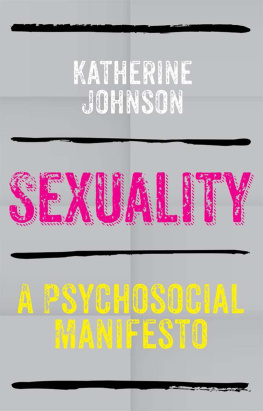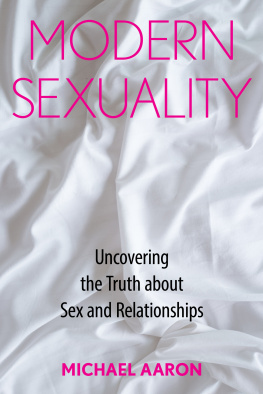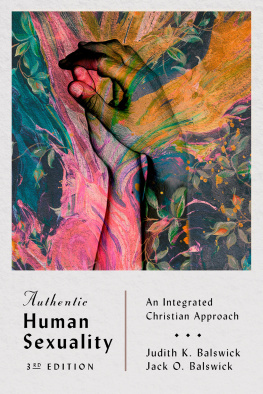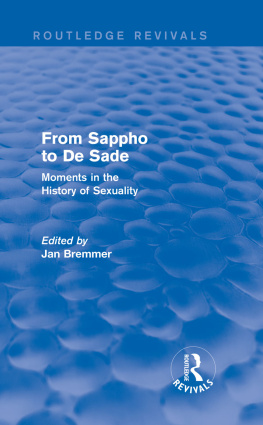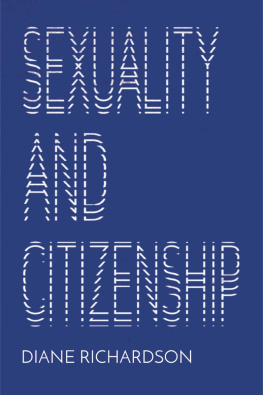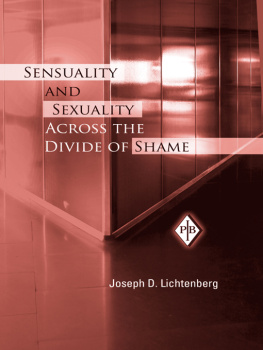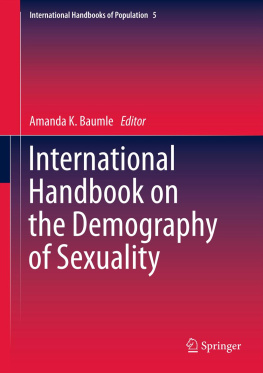Contents
Guide
Pages

For Dee with love and in memory of Derick Johnson missed as always.
Sexuality
A Psychosocial Manifesto
KATHERINE JOHNSON
polity
Copyright Katherine Johnson 2015
The right of Katherine Johnson to be identified as Author of this Work has been asserted in accordance with the UK Copyright, Designs and Patents Act 1988.
First published in 2015 by Polity Press
Polity Press
65 Bridge Street
Cambridge CB2 1UR, UK
Polity Press
350 Main Street
Malden, MA 02148, USA
All rights reserved. Except for the quotation of short passages for the purpose of criticism and review, no part of this publication may be reproduced, stored in a retrieval system, or transmitted, in any form or by any means, electronic, mechanical, photocopying, recording or otherwise, without the prior permission of the publisher.
ISBN-13: 978-0-7456-8895-4
A catalogue record for this book is available from the British Library. Library of Congress Cataloging-in-Publication Data
Johnson, Katherine E.
Sexuality : a psychosocial manifesto / Katherine Johnson.
pages cm
ISBN 978-0-7456-4131-7 (hardback : alk. paper) --ISBN 978-0-7456-4132-4
(pbk. : alk. paper) 1. Sex. 2. Sex (Psychology) 3. Queer theory. I. Title.
HQ21.J58 2014
306.7--dc23
2014019992
The publisher has used its best endeavors to ensure that the URLs for external websites referred to in this book are correct and active at the time of going to press. However, the publisher has no responsibility for the websites and can make no guarantee that a site will remain live or that the content is or will remain appropriate.
Every effort has been made to trace all copyright holders, but if any have been inadvertently overlooked the publisher will be pleased to include any necessary credits in any subsequent reprint or edition.
For further information on Polity, visit our website: www.politybooks.com
Acknowledgements
It has taken more years than I initially intended to complete this book and I am grateful for the support and patience of family, friends and colleagues throughout this time. Dee Rudebeck, Jude, Emil, Maia and Silas Marwa and Abi Johnson need particular credit for keeping a sense of humour in the moments it seemed that the book was going to become an additional lifelong companion. I only wish Derick Johnson was also still here to see it finished. Given the delays I am particularly grateful to my editors at Polity, Emma Longstaff for originally commissioning the book and Jonathan Skerrett for seeing it through to publication. I am deeply indebted and thankful for the ongoing influence and support of Lynne Segal, who always impressed that interesting work is to be found on the margins and has provided kindness and encouragement through good times and bad. Co-learning, conversations and critical engagements with Paul Hanna, Ed Moreno, Stella Fremi, Stephanie Davis, Matt Adams, Paul Stenner, Jayne Raisborough, Niki Khan and Hannah Frith have all contributed greatly to ideas developed here. Life at the University of Brighton is enriched by the collegiality in the School of Applied Social Science and collaborations with colleagues from the LGBTQ research hub, particularly Kath Browne, Olu Jenzen, Irmi Karl, Nigel Sheriff and Aidan McGarry, who share commitments to social justice and community-engaged research.
The research on suicide and mental health that features in the book would not have been possible without financial support from CUPP, dialogue with Ben Fincham and collaborations with Paul Faulkner, MindOut and Allsorts vital and vibrant community mental health projects running in Brighton and Hove. Working with Helen Jones, Jess Wood, Jason Saw, Elliot Klimek and service users from both organizations has been life enhancing and I am sustained and encouraged by their passion, activism, friendship and care. I am particularly thankful to Liz for allowing me to use her image from the Focusing the Mind exhibition (Brighton Pride, 2008) in published work. I am also grateful to Michelle Lollo and Caroline Nin for hosting the Paris experience and providing the image (p. 161) to document it, alongside many years of friendship.
Colleagues and postgraduate students in the Department de Psicologia Social, Universitat Autnoma de Barcelona have hosted a number of visits and provided a rigorous testing ground for reflecting on interventions from critical/community psychology and psychosocial studies. Im particularly thankful to Joan Pujol, Marisela Montenegro and Antar Martnez Guzmn and look forward to future collaborations. Michael ORourke, Noreen Giffney and Anne Mulhull need a special mention for running the The(e)ories: Advanced Seminars for Queer Research in Dublin. These intensive workshops draw together scholars and practitioners from queer studies, psychology and psychoanalysis and offer a rare opportunity to read closely and collectively while seeking clarification from the author of the text in hand. The impact of the sessions I have managed to attend over the last eight years is apparent in the pages that follow.
Finally, I am grateful for research leave funded by the University of Brighton, which provided extended periods of time for the basic requirements of research: reading, thinking and writing. In 2007 the Department of Gender and Culture Studies, University of Sydney hosted me for five months providing me with access to their excellent library where I did much of the work for was written at home in Brighton on a shorter period of research leave in 2010. The rest has been carved out, as my colleague Mark Erickson would say, in the cracks of our daily lives. Any errors, limitations and omissions are thus my responsibility, or perhaps I can attribute them to the distractions of Brighton and Sydney; two wonderful cities that provided the backdrop for the writing of this book and home to many queer lives.
Introducing Sexuality: towards the psychosocial
Any polarizing of psychology and history cripples the investigation of the issues that both psychologists and social scientists are trying to understand.
Helen Merrell Lynd, 1958, p. 214
The structure of this kind of conceptual impasse or short circuit is all too familiar: where it is possible to recognize the mechanism of a problem, but trying to remedy it, or even in fact articulate it, simply adds propulsive energy to that very mechanism.
Eve Kosofsky Sedgwick, 2007, p. 635
Sexuality: between psychology and historicism
Despite Helen Merrell Lynds warning polarization between psychological and socio-historical approaches has been an all too familiar feature of late twentieth-century thought, particularly in the field of sexuality. In reviewing prominent theories and debates it is reasonable to claim that this polarization constitutes a kind of conceptual impasse, found in many accounts influenced by either Marx or Freud, or latterly Freud and Foucault, whose vital work sets the scene for contemporary understandings of sexuality within academia and everyday life. This book explores the polarization between psychological and socio-historical accounts that are documented well in sexuality studies and somewhat ambitiously proposes an alternative, a psychosocial manifesto that seeks to stitch and mend the polarization. Yet, as Sedgwick states, trying to remedy, or even articulate the impasse is not without its own problems. Specifically, in trying to articulate accounts of sexuality without recourse to a polarization between psychology and historicism invites us to engage with the psychosocial, but inevitably within this articulation it is difficult not to fall back on the mechanisms that constitute the split.

